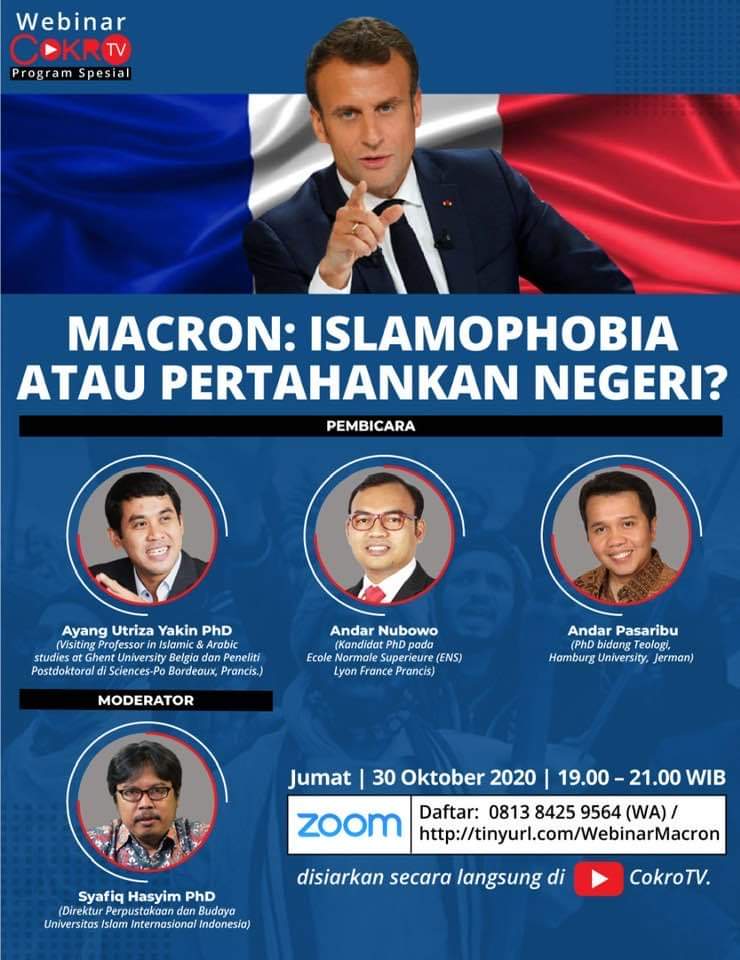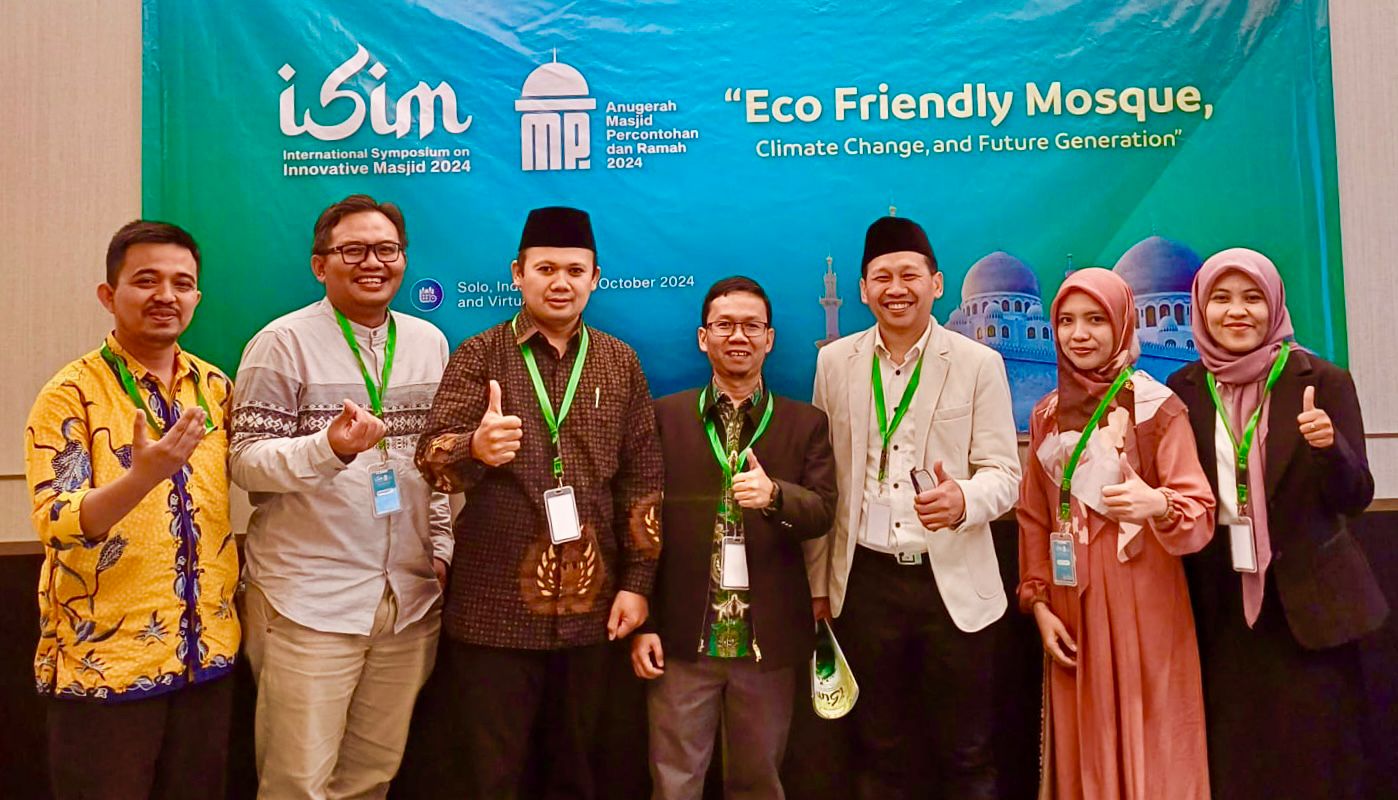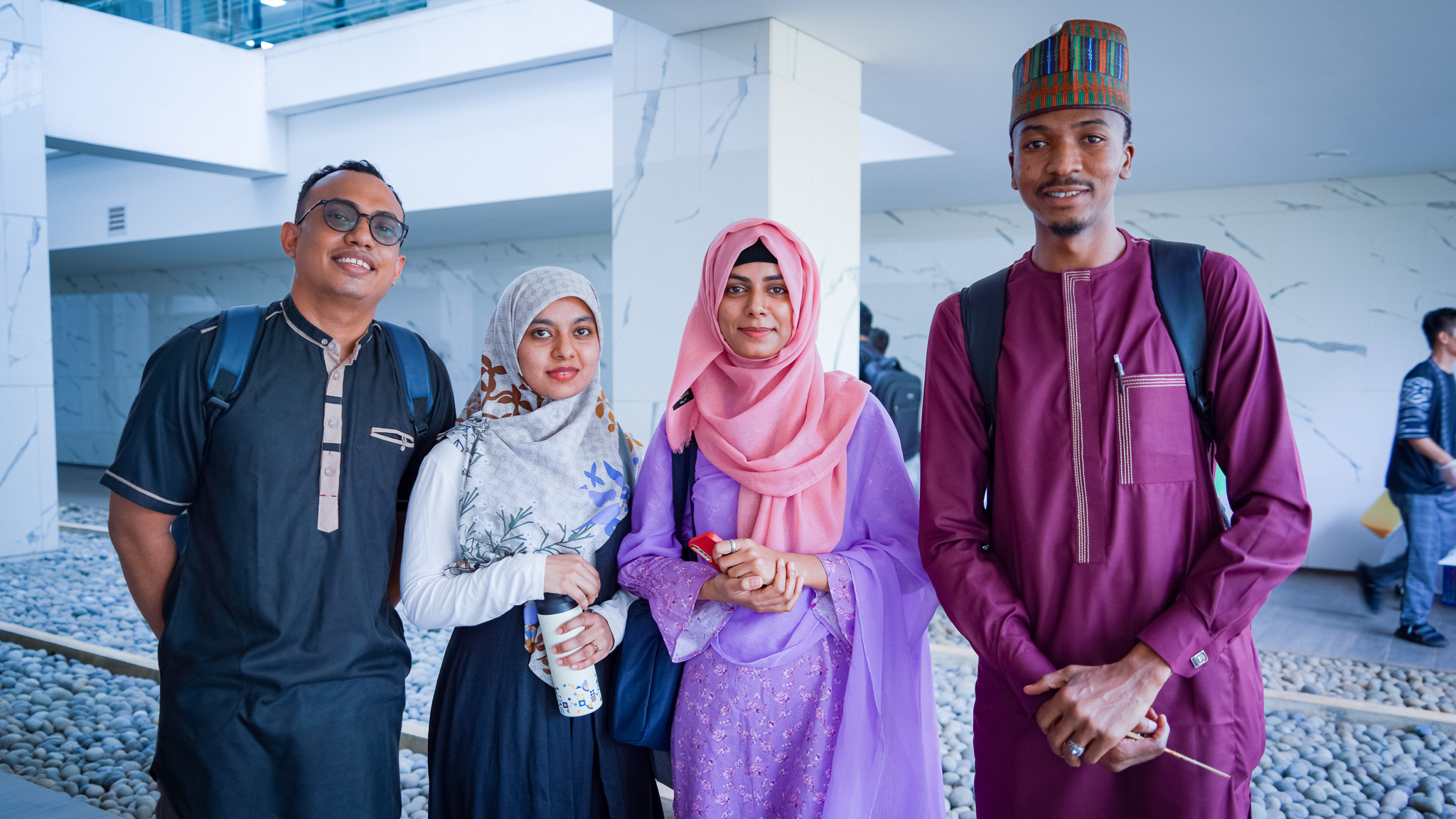Macron's Controversy in the Eyes of European Alumni in Indonesia
November 24, 2020
In recent years, the Muslim world was shaken by the news surrounding the controversial comments of the French President, Emmanuel Macron, as cartoon protests rage across the globe. The cartoon was actually published in Charlie Hebdo magazine in 2015 and continues to draw protests from Muslims worldwide.
This issue heated up again in September 2020 following the trial process of the assault case at the Charlie Hebdo magazine office in 2015 started again. In the same month, Charlie Hebdo also published cartoons of the Prophet Muhammad. And Muslims protested again.
On October 2, 2020, Macron delivered a speech on the Islamists. "Islam is a religion that is currently in crisis around the world; we don't just see this in our country," said Macron in his long speech. On October 16, 2020, Samuel Paty, a history teacher, was murdered with his head severed. Local media discovered that Paty taught a class on freedom of speech by showing cartoons of the Prophet Muhammad as an example. An 18-year-old Muslim extremist from Chechnya murdered him.
Macron's statement in his speech drew protests from the Islamic world, including Indonesia. No less than President Jokowi Widodo stated that Indonesia strongly criticized the French President's statement, which insulted Islam and hurt Muslims’ feelings around the world. Similar criticism came from the Indonesian Ministry of Religious Affairs (MoRA) and the Indonesian Ulema Council (MUI).
European Alumni Discussion
Director of Library and Culture, Indonesian International Islamic University (UIII), Syafiq Hasyim, Ph.D., led the discussion with the theme "Macron: Islamophobia or Defense of the Country," on the YouTube channel, CokroTV, Friday (30/10/2020). This discussion invited speakers Ayang Utriza Yakin and Andar Nubowo, both of them Doctor holders from the Ecole des Hautes Etudes en Sciences Sociales (EHESS), Paris, France, as well as Pastor Andar Pasaribu, Doctor of theology from the University of Hamburg, Germany.
In his introduction to the discussion, Hasyim quoted Macron's statement which was considered insulting Islam and caused various Muslims’ reactions. He asked what is going on in France and how should Muslims respond to the case?
Ayang Utriza Yakin, who took the opportunity to speak first, stated that what was conveyed by the French President and other controversial issues must be studied and understood more deeply. Yakin explained that France has adhered to the concept of "laicite" for a long time, so even to address this issue we must first understand the concept. He recounts the history of the French Revolution in 1789, which sparked La Déclaration des droits de l'Homme et du citoyen (the Declaration of Human Rights), which became a pillar of the French state. The declaration states that citizens are free to express their opinion.
In the 1881 law, an article states that all media are free to convey information and opinions in any form. This article includes artists and cartoonists. Cartoon works with blasphemy overtones, explained Yakin, are familiar to French society. And that applies to all religions, not only Islam, so the French feel there is no problem if they create pictures or works of arts related to religious issues.
France is Not Hostile to Peaceful Islam
This statement was supported by Andar Nubowo, who was the second speaker in this discussion. In his view, Macron's case should be examined from the view of how the country's laws apply. France adheres to a system of secularism. "French secularism does not allow religious interference," he said, adding that France still wanted to keep its "laicite" different from other countries.
Nubowo regretted the statement by the former Prime Minister of Malaysia, Mahathir Mohamad, that Muslims could kill French people. Mahathir made the statement via his personal Twitter account, Thursday (29/10). The 95-year-old politician condemned President Macron's actions in allowing cartoons of the Prophet Muhammad to be exhibited and Macron's controversial statements about Islam, which caused many Muslim countries to react. "Muslims have the right to anger and kill millions of French people over massacres in the past," tweeted Mahathir.
According to Nubowo, the statement is hazardous and contrary to the peaceful Islamic principles. France, Nubowo continued, was not hostile to peaceful Islam. They are hostile to extremism which causes problems in Europe, especially France. "The French government is not against Islam, but they are against radical Islam," he said.
The Difficulty of Muslim integration in Europe
Christian perspectives also enriched the discussion of this program. Pastor Andar Pasaribu discussed the impact of this incident on the relationship between Islam and Christianity in Europe, especially Germany. He said that there had been no significant impact on Germany due to Macron's controversy so far.
"The German media hardly identifies the religious background of the perpetrators and victims, but rather the acts of violence that the perpetrators committed," he said. However, Islamophobia is currently flaring up in Europe because of many immigrants who have entered this continent.
According to Pasaribu, immigrants experience difficulties in integrating with the local population and its culture in Europe. A large part of the German population is concerned about many refugee families’ behavior with their disrespect for women and democratic freedoms, resulting in higher crime rates in the country.
Pasaribu is worried about how Islam and Christianity maintain harmony in Asia and Africa, some of which tend to deteriorate. Religion is so easy to be played around in countries that do not apply the separation between religion and state.
He suspects that current France’s situation will lead to an escalation of tensions between Muslims and Christians, increasing violence in the name of religion and restrictions on worship. "We cannot deny that the level of confidence of Christians and Muslims is currently experiencing a lot of degradation," he explained.
He also added that Macron's statement was a form of Islamophobia, particularly because of his background from the Socialist Party. Besides, there are now increasingly strong efforts to defend and safeguard the country's values of freedom. []
Author: Sururoh Tullah Adedoin Uthman
Editor: Ahmad Gaus AF
- UIII Extends Application Deadline for 2025 International Admissions
- What Does Eid al-Fitr Mean for the UIII Academic Community?
- UIII PhD Scholar Ararat Kostanian Delivers Lecture at Armenia's Yerevan State University
- Swedish Ambassador to Indonesia Applauds UIII’s Vision, Explores Future Collaboration
- Depok Mayor Supports UIII as the Green Lung of Depok and Beyond
- Depok Mayor Pledges to Build Performance Hall at UIII
- New Parking Facility Launched, Part of UIII-Sentra Medika Hospital Partnership
- Yogyakarta’s UII Won 1st FisFastFest’s Clash of Campuses
- Vice Minister of Religious Affairs Praises UIII as a Global Hub for Islamic Education
- Hurray!! UIII Wins Football Championship


